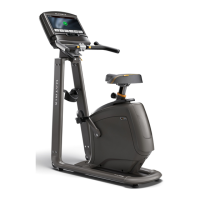15
USING THE HEART RATE FUNCTION
The heart rate function on this product is not a medical device. While heart rate grips can provide a relative estimation of your actual heart rate, they should not be relied on when accurate
readings are necessary. Some people, including those in a cardiac rehab program, may benefit from using an alternate heart rate monitoring system like a chest or wrist strap. Various
factors, including movement of the user, may affect the accuracy of your heart rate reading. The heart rate reading is intended only as an exercise aid in determining heart rate trends in
general. Please consult your physician.
Place the palm of your hands directly on the grip pulse handlebars. Both hands must grip the bars for your heart rate to register. It takes 5 consecutive heart beats (15-20 seconds) for your
heart rate to register. When gripping the pulse handlebars, do not grip tightly. Holding the grips tightly may elevate your blood pressure. Keep a loose, cupping hold. You may experience an
erratic readout if consistently holding the grip pulse handlebars. Make sure to clean the pulse sensors to ensure proper contact can be maintained.
WARNING!
Heart rate monitoring systems may be inaccurate. Over exercising may result in serious injury or death. If you feel faint, stop exercising immediately.
Console Supported Heart Rate Protocols
XER Bluetooth
XIR Bluetooth
XUR Bluetooth
The first step in knowing the right intensity for your training is to find out your maximum heart rate
(max HR = 211 – (0.64 × Age). The age-based method provides an average statistical prediction of
your max HR and is a good method for the majority of people, especially those new to heart rate
training. The most precise and accurate way of determining your individual max HR is to have it
clinically tested by a cardiologist or exercise physiologist through the use of a maximal stress test.
If you are over the age of 40, overweight, have been sedentary for several years or have a history of
heart disease in your family, clinical testing is recommended.
This chart gives examples of the heart rate range for a 30-year-old exercising at 5 different heart rate
zones. For example, a 30-year-old’s max HR is 211 – (0.64 x 30) = 192 BPM and 90% max HR is 192 ×
0.9 = 173 BPM.
TARGET HEART RATE
Target Heart Rate Zone
Workout
Duration
Example THR
Zone (age 30)
Your
THR Zone
Recommended For
VERY HARD
90 – 100%
< 5 min 173 – 192 BPM
Fit persons and for athletic
training
HARD
80 – 90%
2 – 10 min 154 – 173 BPM Shorter workouts
MODERATE
70 – 80%
10 – 40 min 134 – 154 BPM Moderately long workouts
LIGHT
60 – 70%
40 – 80 min 11 5 – 134 BPM
Longer and frequently repeated
shorter exercises
VERY LIGHT
50 – 60%
20 – 40 min 96 – 11 5 BPM
Weight management and
active recovery
ENGLISH

